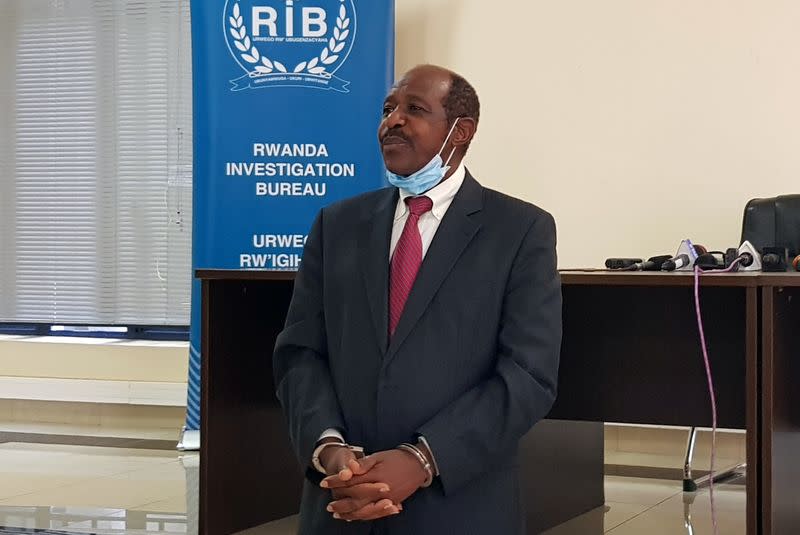'Hotel Rwanda' hero's family accuses government of kidnapping him
NAIROBI (Reuters) - The family of Paul Rusesabagina - hailed a hero in a Hollywood movie about Rwanda's 1994 genocide - have accused authorities in Kigali of kidnapping him, a day after he was paraded before media in handcuffs.
Rusesabagina was played by Don Cheadle in the Oscar-nominated film 'Hotel Rwanda', which told how hotel manager Rusesabagina used his job and his connections with the Hutu elite to protect Tutsis fleeing the slaughter.
Rwandan police said Rusesabagina - who called for armed resistance to the government in a YouTube video - was arrested on terrorism charges on an international warrant. His family dispute that.
"He was kidnapped and taken by extraordinary rendition to Rwanda," his daughter Carine Kanimba posted on Facebook.
Thierry Murangira, the spokesman for the Rwanda Investigation Bureau, said that was false.
"He has been arrested in accordance with the law," Murangira told Reuters. "He was subject of an international arrest warrant."
Another daughter, Anaise, told the BBC World Service radio that her father had last called them on Thursday from Dubai and said he would "never go to Rwanda on his own will".
Officials in Dubai, part of the United Arab Emirates, did not return calls seeking comment on the arrest or any extradition agreement. Rwanda's ministers for justice and foreign affairs did not respond to messages seeking comment.
Rusesabagina moved abroad after the genocide and won worldwide acclaim, receiving the United States' highest civilian award, the Presidential Medal of Freedom, in 2005.
Some genocide survivors and President Paul Kagame have disputed Rusesabagina's account of rescuing Tutsis or accused him of exploiting the genocide for commercial gain.
Rusesabagina, whose father was Hutu but mother and wife were Tutsi, has denied exaggerating his role.
CALLS FOR ARMED STRUGGLE
A Belgian citizen who resided in the United States, Rusesabagina has called for armed rebellion against Kagame, who came to power in 1994 when he led troops into Rwanda to end the genocide.
In December 2018, Rusesabagina posted a video on YouTube denouncing Kagame. The video identified him as the president of the Mouvement Rwandais pour le Changement Démocratique (MRCD) and the National Liberation Forces, which have been linked to attacks in Rwanda.
"The time has come for us to use any means possible to bring about change in Rwanda as all political means have been tried and failed," he said. "Rwandan people can no longer stand the cruelty."
Kagame's stabilisation of Rwanda, economic reforms and anti-corruption drive won international plaudits. But Rusesabagina has said Kagame keeps power through muzzling the media and suppressing opposition, charges the government denies.
Human Rights Watch said in 2017 the government routinely tortured detainees - accusations the government denies. A United Nations delegation investigating the accusations was forced to leave Rwanda, citing government interference.
Kagame won nearly 99% of the vote in the last election. One of his main opponents, Diane Rwigara, was jailed with her mother for more than a year on charges that judges later dismissed.
Speaking to Reuters, Faustin Twagiramungu, a former Rwandan prime minister living in exile who shares the leadership of MRDC with Rusesabagina, denied Rusesabagina was engaged in terrorism but repeated the movement's call to arms.
"It is not because we don’t like democracy or western countries, but we feel we have been abandoned," he said.
(Reporting by Duncan Miriri, Katharine Houreld and Hereward Holland; editing by Katharine Houreld, William Maclean)



